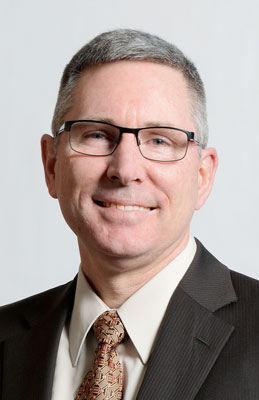Thomas Sack
President and CEO, MRIGlobal
Oct. 2009–Oct. 2013
SVP and director of
technical operations
Aug. 2006–Sept. 2009
Regional VP, midwest
operations
Feb. 1999–Aug. 2006
Director, chemical services division
There is no shortage of things that prompt an audible rise in excitement in Thomas Sack, the president and CEO of MRIGlobal. His voice swells with pride as he discusses his more than 30 years with the company, dating back to its days as Midwest Research Institute. It jumps a decibel or three when he recounts successful engagements with healthcare and government entities, some of which he’s even allowed to mention by name. But nothing sparks as much of a reaction as his retelling of, well, an encounter with MM&M ‘s photographer.
“It came out that he helps run the music program for the Kansas City Irish Fest, and I have a band that plays a little Irish music,” Sack says hopefully. “I doubt anything will come of it, but …”
Those who know him and know of him wouldn’t be surprised that Sack’s enthusiasm extends beyond his day job—which, for the record, he is very, very good at. If he weren’t, there’d be a problem, as few gigs within and without healthcare impose such a broad range of logistical demands. As a privately held applied research institution, MRIGlobal counts as its goal “using science and technology to create solutions that make our world a better place,” according to Sack. To accomplish this, he oversees some 600 engineers, chemists, biologists and microbiologists—to say nothing of extensive support staff—and $100 million annually in contract research on defense, energy and global health initiatives.
That’s no small charge, which is why MRIGlobal has started to emphasize its program-management expertise. Take the firm’s work late last year on behalf of the government’s Defense Threat Reduction Agency, which saw the company deploy two mobile clinical diagnostics labs designed for use in Ebola treatment to Sierra Leone. Transporting the labs—self-contained units equipped with generators, clean water and living quarters—required locating an Antonov An-124 Ruslan jet for the Kansas City-to-Sierra Leone jaunt.
“When I started my career, most instrumentation wouldn’t survive if you moved it outside. We can now outfit mobile containers with the same equipment you’d find in a fixed brick-and-mortar lab,” Sack says almost nonchalantly.
Or take another contract—technically a contract amendment, for $3 million—that MRIGlobal recently secured, this one from the National Cancer Institute’s PREVENT Cancer Program to produce RG1-VLP, an HPV vaccine for the 14 virus strains not affected by existing vaccines. The project will require MRIGlobal to coordinate the efforts of a range of pharma and government entities. “I’m not sure we’re at liberty to describe with whom we’re working, but our job is to bring people together. How do you develop this vaccine? How do you test it?” Sack asks.
Bringing people together should rank high on any list of Sack’s skills, right up there with mass spectrometry. The latter, in fact, led directly to Sack’s arrival at MRIGlobal. As a college student studying chemistry, he got his foot in the door as a dishwasher.
“I thought I’d died and gone to heaven. To wash dishes at Midwest Research Institute? Amazing!” he recalls. When he joined the company full-time, his expertise led to work on a range of chemical-analysis projects.
At the same time, Sack knew what he didn’t know: “As a young scientist, you believe that technology will get you all the way there. But it’s not always the answer. The human element is a key piece.” His people skills kick-started his rise in MRIGlobal. “He’s a really intelligent individual, but he doesn’t have to be the smartest person in the room,” says John Stanley, PhD, MRIGlobal’s VP of emerging technologies. “He likes the idea and reality of setting realistic but challenging goals.”
As MRIGlobal grows, that approach should continue to resonate. “As a research organization, we bring an objectivity to solving problems,” Sack says. “There’s no preconceived notion as to how to solve a problem. After working with the government in so many different capacities, there’s a breadth of capability that we can bring to bear, which is hopefully very appealing to the commercial sector.” —Larry Dobrow
From the February 01, 2015 Issue of MM+M - Medical Marketing and Media







